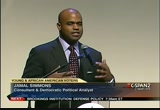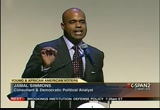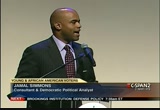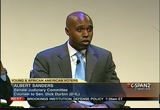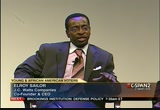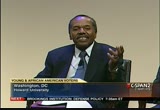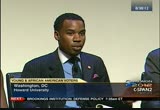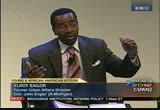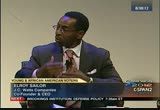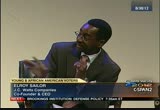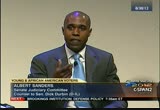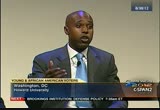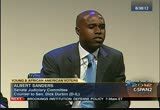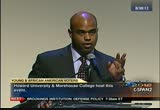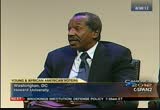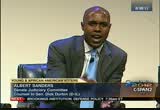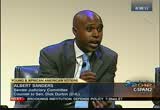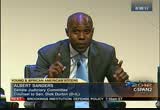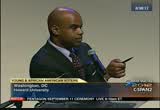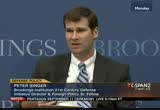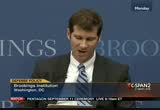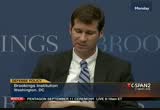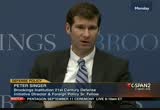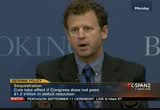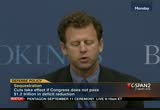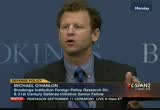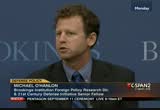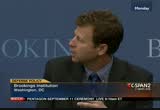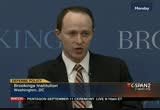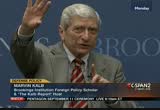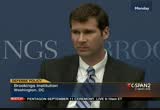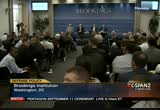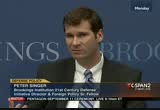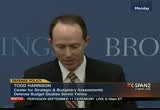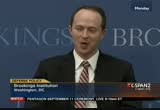tv Today in Washington CSPAN September 11, 2012 6:00am-9:00am EDT
6:59 am
>> there is no the community in the united states of america the votes overwhelmingly 90% for one party. in 1996 i realized we voted republican. we only -- were the only race in the united states of america that is done. it's created a system that decided the republican party where republicans say we've got
7:00 am
to win without them. so somebody starts with whether they are racist or not racist, people say stupid things in both parties. i used to get into that debate. i don't anymore. i'm just about trying to build people up, not tear people down. so that was a stupid discussion. do i think that is reflective of the whole party? now i don't. i don't publicly that. my point, i'm not trying to defend him. i don't come to these discussions trying to defend republicans nor do i come trying to defend democrats. i comes and here's what i believe and here's what i support. getting back to the point, if were able to look at some kind of model where we to 20% of the african-american committee and we said okay, you be a democrat, get engaged, go work on the hill, be a big fundraiser, to the policy stuff, then you take another 20% and you say you go and join republican party, get
7:01 am
on their staff, that's 40%. you take the rest of the 60% and say you don't get engaging any part or. he beat businessman, a mom, a teacher, do whatever. now you have 20% engaged in the democratic party at the highest levels, so you've got -- then you take the republican side and you get the same thing. you come up and you great a 10-point plan and you say these are the things we both care about in our community and you let the republican colleagues take the plane and you let the democratic colleagues take that plan. they present to the campaign, to the governors, to the mayor, if you can agree into six of these things we will go back to the 60% and try to get our folks to turn it. if jamal comes mean says i've got my candidate to bite on six of these issues and i can so i can only get my guide to bite on three, i couldn't get my guide to support.
7:02 am
he would only support three things. we need have no permanent enemies, just permanent interest. until we get about the business of doing that versus all the back and forth arguing about what todd akin said, about what democratic policy is better. i've done that for 20 years. we are in same boat. unemployment is getting hired. there's more brothers and sisters in jail. less and less of us are getting married. you can go down the list. >> professor morris? >> that's just my point up here. >> you also probably remember the kerry convention and other efforts in the past to try to bring african-americans together. you think is something we -- >> howard and other universities with all trying to organize policy.
7:03 am
conferences where people could articulate things. one of the things that's interesting is when sometimes can be a little bit -- when obama won the effort and energy that african-americans put into his victory meant that many of the associations which -- this happen before. it changes things. the one thing to remember, we are the only race, only race that the republican party has not pursued. they -- zero. so they get zero response. there's nothing in any of the associations that can be said to lead african-americans, large associations, the fed responded to cited or articulate. the problem is and question was about coalition building. i think that is an important issue. it would be easy to build coalitions if the republican ticket wins because it would be a lot of people who say we don't have to have coalitions that are just response. the problem is that without some of these organizations that were
7:04 am
not as responsive as they should've been after obama got into the white house, we cannot maintain without a link left. there are a variety of explanations for the. probably my simplest example, shirley sherard. remember, we immediately conceded to the right wing media spin can you explain who she is. >> the african-american secretary of agriculture who was falsely accused of making quote racist statement. and some of the civil rights organizations joined in that accusation. i won't name them. but the point here is that she would take every opportunity organize an agenda further to the left and without iraq we would come some of the white american electorate so you have votes that are not as well organized as they should've been there's a long discussion why not and i think certainly if
7:05 am
there's any conceivable agenda, for example, one of the reasons african-americans switch to the democratic party in the '30s was because roosevelt has a progressive agenda. if the progressive agenda looks more viable and to get over the republican backlog and that's not a partisan statement, just a descriptive statement, then you would get more coalition globalized. if you watch testimony in congress the other day you would seek african-americans taking the lead and testifying in favor of medicare. so once you have a feasible agenda you get somewhere. right now we've been stuck in fighting back. >> my name is cindy brown. i'm a freshman. psychology major and i'm going to backtrack a bit. you mentioned something about substantiating a sexuality. i don't need anyone to substantiate any scientist politician to substantiate my sexuality or who i am as a woman. i need the government to stay
7:06 am
out of my body and to stay out of my relationships until i'm ready to get married. i don't need a scientist to tell him or not. on whether or not it's relevant to what your political standing is. i know i need a candidate is going to fight for me and every democrat that i represent the f. i want gay marriage i need a candidate to represent there. if i want the government to stay out of my body up on a candidate that represents a. i don't need anyone to tell me that i am real, that i am let's say a real woman, a real lesbian or whatever. that's my business, not the governments. i just want that to be clear. [applause] >> and i agree. i hear you speaking from your heart. i'm going to talk about things are mayor. i don't know you but i love you as a brother, regardless --
7:07 am
>> sister. >> sister, brother, regardless of which orientation is. i do, that's not my issue here. i apologize, i misspoke. i can't tell. but my point is, regardless of which orientation is a what you think other people's orientation should be, you're absolutely right. that's not the governments business. the government should be about love. and support and respect, and i believe that from the bottom of my heart. but again, i support the bible and i'm just, you can't, i don't think, just like it's not fair for me to tell you what you should and shouldn't do with your life. it's not fair for you to say, it's not appropriate for me to speak truth to the bible. >> [inaudible] >> you have a question? >> you're right. the bible is not science. its face. [inaudible] >> i made a point. i said science in america and the free world, you have
7:08 am
molecules, biology and science. >> let's just say, so we can move past the point, that there are questions about believes that occur and are questions about policy that occur. and that our founding fathers established a government without regard to religion. and so as a public policy matter which is what we here arguing about, not as much about faith, that we have to sort make judgments about how to have a system, a government that treats all citizens federal regardless of their beliefs and backgrounds. sochi want to ask another question? okay, thank you very much for your statement. >> can i jump in right there? >> go ahead. >> just to bridge that a little bit. there's a broad policy statements. my college my left often said he speaking from the heart. very, very simple, basic black
7:09 am
and white. what we need to essentially emphasize is that what when it comes to government there is no black and white. it is very, very circumstantial, subjective, and the mistakes of people who govern based upon their narrow view is that they take names in a very, very narrow life. when most things are complex and have broad social forces that influence what happens. whenever you try to take a sweeping policy and put it in a narrow light, it disenfranchised guys, it damages, it's done intensely malicious. you can't paint issues in a very, very narrow simple like him even if you're doing it in love. you have to contextualize. you have to make it as diverse as complex as it is. >> and that's a problem with the debate. >> let's get to the question. >> speaking of disenfranchisement -- >> can we hear your name?
7:10 am
>> sorry. eleanor traylor, i work at howard. some people call me professor. so i am just wanting to speak to disenfranchisement, to slippery slopes, the speaking from the heart and like manner. and i wish to address to the panel an enigma that i experienced. i am perplexed and -- >> and that experts will in any question, right? >> yes. how can anybody of leisurely speakers -- leisurely speakers
7:11 am
-- leaderly speakers, those who desire public office of any stripe tolerate in the least the suppression of the very definition of what america has come to mean to the world? that is the right to vote. i have not heard that spoken to spend you all think that id laws love impact, how will that play out in this election season? >> they will throw have an impact. why we have a chance to talk about this. there have been three types of vote suppression laws that are running rampant across this country. folk should know since the 20002010 election, just about 40 states have introduced laws that would require some type of photo identification to be shown at the polls for voting. some of those states have passed
7:12 am
and enacted the laws. what does that mean? well some people think hey, pull out the idea out of your pocket or everybody has an id. actually it's not that simple. the double is always in the details, and what we've seen raised on the center had a new york center law school said there are 5 million people who do not right now have the kind of id that would satisfy one of these voter id laws. who are the people? surprise, surprise. african-americans, latinos, young voters, that disabled people, people of lower income status, and it's incredibly unfortunate because the point that the professor is making that the right to vote is one that is essential and sacred in this country. so if you think about the constitution has been amended more times to protect our span the rights to vote and to have any other issue. they are six constitutional amendments that addressed that point. now on our watch after we've elected the first black president, a year after we have
7:13 am
erected the martin luther king memorial, and 47 years after john lewis and others engaged in what we call bloody sunday, we're now watching and allowing a series of states to pass these laws that will have a direct impact on the vote that you and i and people that look like us are going to cast. so it's right to raise that point. it's not just voter id. it's voter id and it's also going back to early registration. early voting period, excuse me. who vote early? people who can't necessary take off a long day of work. who vote early? people who may need help getting to the polls, people who are in school, and african-americans. on the sunday before the last election in florida, african-americans and latinos combined for 51% of all the people that cast a vote on that day. how do you think of the rick scott and republicans in florida respond to the. they said no more early voting on the sunday before election.
7:14 am
all across the country whether it's florida or ohio, we're seeing a large coordinated well-funded attack on the rights to vote and we shouldn't stand for. it doesn't stop there. it's not just voter id. it's not just cutting early voting period. it's making it harder for people to register to vote. in 2008, 83% of young people under the age of 30 that were registered got out to the polls and voted. follow me. the problem is only 54% of young people are registered. so what conclusion do you may? if young people are registered they would get up on election day and they will go and vote. what you do about that? let's go back to florida. a critical state as we all know about -- want to florida to? they said we're going to put up so many barriers on third party organization registering people to vote that basically it drives the whole process of. it's now for the first time in the history the league of women voters, boy scouts, rock the
7:15 am
vote, a number of other folks have said we are not going to register people to vote because of these laws. a couple months ago the new york times did a study and said, at this point in time there our 90,000 less new registered voters in florida and the were in 2008. jamal remembered about how young people can have direct impact on this election. and the truth is that we are going to see not only these voter id laws but cutting early vote and voter registration have a direct impact on whether our citizens can get out there and exercise the right to vote. last thing let me say this. who has a smart phone? poll about. i'm not getting paid to do this. whether you are on android or iphone, and pull down the election protection application to get that election protection application that is supported by rock the vote and the lawyers committee for civil rights, it
7:16 am
will confirm that you are registered. it will tell you where your polling places. it will give you a number to call if have problems on election day and will help people report any issues that you see. folks when the country see this is a big issue. it's important and when to take the power back into our own hands. thank you. >> thank you, mr. speaker but i just want to ask one question. >> we've got to move on. sorry, can we move onto the next question? >> oh, sorry. >> we got a lot of questions. the panel will be here afterwards and you'll be able to ask a follow-up. we have a question from twitter that is on that and i will let the two student presidents get involved. is a more important for college students to vote where they go to school or to vote at home? so they go to school at a certain state nine months out of you. this is ghana piggyback to piggyback to question on registration. >> we have that question a lot. would've a lot of students who
7:17 am
are from out of state. so we do this. for incoming freshmen that will spend the next four years in the state of georgia, living and governed by policies and georgia we encourage them to register each georgia voters but we do not encourage our voters to seek state funding and georgia because they cut their fun. but for students who are planning to move our platform for other reasons, registration back home, we do encourage them to stay in is like swing states are states that are critical whether vote is a lot for influential. but for incoming freshmen, sophomores, encourage them to register to vote. they register their, the vote there, everything is taken care in house. outside of that with the voter suppression, it is very real, very, very systematic, and it is troubling. we also encourage our brothers to make sure that they are
7:18 am
calling their elected officials and been engaged in being involved in the political process. >> brittney, you want to say what happens to people at howard? >> we've got left up to the discretion of the students. seeing as we're in d.c. we are in a different kind of situation, seeing as we will have representatives to vote for so we have a void -- voice for the president. so there are students who have decided that they want to submit absentee ballots and that's fine. personally i'm registered to vote in d.c. because this is my community and i felt like it was a sacrifice i decided to make to engage in my community and have a voice in this community. but i think it should be left up to the students. as long as they but i don't care where they are registered. >> i want to go what the professor lusane a minute ago when she talked about who's
7:19 am
responsible for this. i'm not going to pin point anybody but want to bring back to what we're talking about earlier. we talked earlier about how the republican party, they're not creating african-american policies. they are not creating youth center policy. we all know that's what happened. okay, they're not making policies to benefit african-americans, latinos are young people so we turn out to vote. what do we do? we pass laws that are -- and basically they just want to take the pencil eraser and a race a whole group of people so they'll have to do with them. and then we wonder why they are not talking us. not like they don't have to talk to us but they're going to great policies to mature we don't have an impact on how the election turns out. >> what i would recommend, regardless of who you want to vote for, romney over obama, and hit me on this for a second.
7:20 am
the tea party, some good policy, some bad policy, i think those guys got a right now. is why i say that. those are republicans who said we are tired of the republican members of congress not speaking to her issues. whether you like the issues or not they said these are our issues, they went to republicans and they said if you do not support these principles that we have, we're going to put somebody else in office. my challenge to the young people in this room, voter suppression, republicans are pushing it and there are democratic primaries that are pushing the same thing. it's being done on both sides of the aisle -- >> which democrats? >> i said it's been pushing some democratic primaries. [inaudible] >> in the modern era? >> in general. >> i would ask of that sentence. >> let me finish. voter suppression is not anything new. that's been something going on for long time and that's wrong that might that's my only point on that. >> i said in general.
7:21 am
from the beginning of time voter suppression come anytime you, you do it is wrong. let me finish my point. >> so conservative democrats used to do its? >> both sides have pushed. democrats, conservative democrats. >> conservatives are the ones who typically do this spent both sides of push and it's wrong. i'm not saying who's done a more or less. spent i think you're making a good point because i think it's important political note to talk to folks about organizing, believe in them or disagree with them or not. tea party has done a phenomenal job of organizing. but i will say this. i can't sit here and allow you to make an equivalence between the role that the republican legislature across the country have played in suppressing minority's -- >> and it's wrong, i agree with you it's wrong. i said any facet it's wrong. i didn't want to leave it out there that it's been done on both sides and it's wrong.
7:22 am
>> let's have a historical lesson for a minute because were on a college campus. the reality is for a long time there were conservatives identified as democrats. overtime those conservatives became republicans. they behaved at the same way. they just change the title they had spent it's not quite that equivalent. >> day -- [talking over each other] >> those pre-segregation efforts are just that. you can make any equipment there. and wanted to imitate the tea party, people with billions of dollars we could do but that's not it. >> so fine a billionaire to organize -- >> people mobilize activity. i think that is the opportunity we need to take that can be able to recognize it that the assertion of democratic rights needs to be reaffirmed because it is obviously under attack by groups of people who think they can one by keeping people away
7:23 am
from the polls. >> i would argue like the professors that if somebody paid me a billion dollars to organize i would go organize, to. >> so closing that outcome if you're going to vote for president obama, if your democrat, my only point there for the young people is, take a playbook from the civil rights movement or from the tea party movement. don't just be democrats and beat up republicans. i'm not just a republican beating up democrats. i'm a republican going to my party saying here of the things you're not doing for my community, and we try to demand those things hold them accountable. all i'm saying is if you're going to vote for president obama or president mitt romney -- [inaudible] >> or if he wins he will be president. >> we have 15 minutes left for questions from the audience. >> hold your party accountable. >> go ahead of. >> my name is john, class of 2004, morris college. thank the panelists for the great work here today. in looking at the political
7:24 am
landscape, it seems that relationships across the aisle are becoming more and more toxic, and that there's less tendency to work together. it also seems that personal religious beliefs are more and more visible in the current political conversations and debate. i just wonder where the panel sees as having effect in the future, what do you think this is going to do to politics down the line? and that's my question. >> as somebody that works on the hill now, i haven't been there as long as some other folks but i will make this one observation. you are absolutely right. if we continue in the direction that we're going now, i'm not sure how we'll ever get get anything done. now look, the problem is that during democratic administrations there are pushback from the republican side. under republican administrations
7:25 am
this push backs on the democratic side. i'm going to make this point bigger, not too partisan. but at the end of the day it seems as if compromise and finding a way to work together has become a bad word and the concept to be avoided. if that were the case when our great country was founded and look at the history of our country, if compromise affinity network it would've been no declaration of independence, no constitution, not much progress over the years, all the issues that matter. so yes democrats have to work with republicans and republicans at work with democrats. i will say this. i have seen in the senate over the last couple of years the filibuster used more times than ever before in our history. what does that mean? it means that important legislation like, you know, economic development, whether it's health care reform, whether it's judges, all these things are really important have been
7:26 am
held up from even having a debate, from even being brought to the floor and saying, you know what, i disagree with you on this, let me have my an amendment. voted up or down and then let's go have a debate so the american people can see what's going on. here's what i think. if i have a disagreement, you and i had a couple disagreements today. we've had a civil conversation. i hope we can take our model and incorporate this on capitol hill because there's no civil conversation happening there. and long overdue for that to happen. >> i think that there's a little bit of 1980 for a model going on. take for example, this last, congressman akin and talking about legitimate rape. before that there wasn't an actionable issue forcible rape in the legislative agenda. that democrats are partly responsible rate for even letting it go unnoticed. they have to push it out because it wasn't actionable.
7:27 am
but nobody in the media, now that -- has ever focus on the fact that a lot of the stuff is distracting from real policy agenda. one always has to look at it. -- >> and paul ryan was one of the cosponsors. question over here. >> is there any other -- my name -- i attend howard university of middle school science and mathematics to my question is is there any evidence of same-sex marriage other than limited defense? >> can you ask it one more time? of [inaudible] >> of their lives good question because it got a lot of response from your crew. and you ask it one more time? >> is there any other defense against same-sex marriage -- >> other than religion your.
7:28 am
>> against same-sex marriage. >> now. of [inaudible] >> thank you for your question. >> when it comes to better, when it comes to the federal or state, usually define marriage, there is a federal policy that basically defines what he marriages. so when it comes to the natural debate, it's not really something that can be pulled into -- >> there was a defense of marriage act. >> there's no federal, it's not the side by general assemblies, just like the motor -- voter suppression laws better in seven of the 10 largest active american populations in the country. emphasizing the engage, not the federal, not the senate by the general assembly and state houses. >> i think the gentleman in the
7:29 am
white, you were standing up for a long time. did you have a question? >> good afternoon. my name is taylor, i'm a 2012 2012-2013 student at morehouse college but my question, speaking from the heart, i'm5"#f asking because it genuinely did not sit well with me, the conversation that took place a couple minutes ago regarding abortion. so could you please again explained reflate your position on abortion? >> i have a daughter, 13 years old, she got raped i would have to pray on it and i don't know how, how i would do with it. i just don't know. >> so your position is i don't know? >> if it comes to rate, as a dad i don't know. speaks of the question is -- and i -- what should the federal position be -- >> all, the federal position. i think the federal position, for my personal perspective on abortion should be, that should
7:30 am
be an individual choice. i do think the federal government should be involved in that. [applause] spent that's as again, i don't think the federal government should be involved in that decision. >> that's clear. do we have a question over here? young lady in the red./. >> my name is faith evans, and i attend howard university middle schools mathematics and science. and my question is directed to professor morris.k you said that you are deeply rooted in the bible. the bible shows -- oh, mr. sailor, i'm sorry. i'm a christian as well, and i think that when you say, when you're saying things about just somebody -- i think that the bible, the bible doesn't show any discrimination. so i think that didn't sit well with me at all.
7:31 am
and i want you to put it up on what you mean. >> there are three verses in the bible but i don't want to cite them all here, that speak specifically to homosexuality. afterwards catch me and i can pull them up and you can read and. it doesn't talk about discrimination. it talks specifically about a man lusting after a man or a woman lusting after a woman. so the bible is real clear on its position on homosexuality. the bible is not ambiguous on that. it's very clear. i'm not talking about discrimination or love. i'm just saying that it's very clear on the. >> so elroy will lead a bible study over here right after the session. feel free to come down here and get your debate on. >> hello everybody. i'm a senior legal communications major in detroit, michigan. i'm also serve as the president of the naacp and i'm ecstatic
7:32 am
system for impact which is a nonprofit here in d.c. that is a rancid of a geisha political involvement and -- specs beat up a little slower, a little slower and louder spent my name is crystal, i'm a senior legal communications major hailing from the great city of detroit, michigan, and on campus i serve as the president of our naacp and a must have existed for impact. my question is for anyone that wants to address this question. uganda spoke about the consistency of african-americans been active in the political process, things of that nature and would make that almost sound like an issue of our generation when that's an issue of every generations i wanted to know just decides and how active we are not in the process, the past presidential years, how can we keep people active all year round? >> anre? >> i can speak to what we've done actively, coming out of -- >> hold on a second. can the folks who are leaving
7:33 am
try to keep it down so we can hear what's going on? thank you. >> we recently had a conference a couple months ago, national -- i forget the acronym. at the conference for studer -- student leaders. we came together and build a coalition. and when i have an hp see -- hbc unified national drive. they are working together to get all the campus is registered. the thing about it is we're doing this in concert working under the radar so we have done press releases and talked to big news organizations because we are not interested in having the police busy -- publicity. there's great leaders from texas, all the way north, lincoln, who all are all there a text message with a magenta work together for registration, issues of lobbying for issues make sure our voices are heard at the city levels and state
7:34 am
levels. this type of coordination is happening but has to happen in a greater sense outside. so the work is happening. make no mistake about it. >> i think he's right. on top of the work, one issue that i sort of have been trying to grapple with my own mind is why is it that we've seen all the other groups, we have seen latinas, when president obama was elected they came to washington with an agenda. the lgbt committee went president obama was elected into washington with an agenda and they pushed their agenda but when it comes to the youth movement, when it comes to african-americans, when president obama got elected with our hope and change post and a veterans and were like yeah, we won. and we sat down. we had no agenda. so people are saying the president didn't do enough for african-americans, but where were we, where was the people saying this is what we want you to do. we want you to do x., z., y. i think one we reelect him and
7:35 am
70 days. on day 71, what we need to do as a committee, both as young people, as african-americans we need to sit down and come up with a collective agenda and we need to take our agenda to washington. our agenda need to come to washington and we need to have a fight with anybody is going to get in the way of our agenda. that's what we saw the hispanic community do. one community that i novel out is how to get was the lgbt committee. if you got in that way, they ran commercials in your district. they sent out mail in your district. they did everything possible to show that you are an enemy to them. nobody said anything because we all know that the politicians that we do with, and chris christie said it best. they are affected by public opinion. so we are the public that provides that opinion am in need of an agenda so our opinions can be educated. >> all right. so we are at the end of our program. thank you all for being here. thank you for this great
7:36 am
audience. [applause] thank you for this great panel. and i want to thank howard university for being a great host not only at this event but also this entire weekend. you make us all feel very welcome. you aren't even when i was 19 and is hanging out in the yard. so thank you all for having us back. >> today marks the 11th anniversary of september 11 terrorist attacks. to mark the occasion leaders take part in a ceremony on the east steps of the u.s. capitol honoring the victims and survivors. we will hear from house speaker john boehner, minority leader nancy pelosi and senate leaders harry reid and mitch mcconnell. that begins life today at 11 a.m. eastern on c-span. >> with the anniversary of september 11 attacks, go to her facebook page to tell us how you think america has changed since
7:37 am
that date 11 years ago. and post your comments and join the conversation with other viewers at facebook.com/cspan. >> next the brookings institution discussion on defense policy. panelists discuss the differences between president obama and republican presidential candidate mitt romney. this is an hour and 35 minutes. >> i'm peter schiff, director of the 21st century defense initiative here at brookings and it's my delight to welcome you all to this session on u.s. defense 2012 presidential election. in many ways the issues in defense and national security have never been more important and more dynamic than they are today.
7:38 am
we have over 80,000 u.s. troops in afghanistan today engaged in a decade old conflict. with emerging strategic threat in issue. we have gained change technologies like robotics that are having massive impacts not just on the battlefield but also shaping the decisions off the battlefield. we have new domains of potential conflicts like cyberspace. we have a defense budget that is best described as influx with the potential half a trillion dollars worth of cuts over the next decade looming that could seriously affect not just the military but also the broader defense economy. and yet in many ways defenses been largely absent from this campaign. yes, we have had some mentioned here and there, but it's mostly been in the realms of symbolism and waging. using optics of making an announcement on retired battleship for issuing talking points on how many times you mention the military and your
7:39 am
convention versus the others have mentioned the military. now, while that may be frustrating to those of us defensive blocks, one can't blame the campaigns too much for not highlighting defense in their strategies because that seems to match where much of the american public is right now. for example, ab abc news and "washington post" a couple that as an opening question of photos what is the single most important issue in your choice for president. 52% said the economy, and number two was health care at 7%. neither defense nor foreign policy are registered enough to make it outside of the other category. similar reuters and it's those ask the question which were the core issues which is what you say is most important thing about the current presidential election? is a jobs and economies, is
7:40 am
healthy, family values, leadership, national security, taxes, foreign policy or representing change? jobs and economy came first at 53%. national security got 5%. foreign policy got 3%. in fact, only jobs, economy and health care even crossed the 10% mark, made into double digits. so what we hope to do today is actually pullback and have a richer discussion on the important question that surround the selection of the person that our constitution actually makes clear their primary responsibility to be the commander-in-chief. so we're going to export issues like how with a presidential candidate shape america's future's -- future armed forces. where do they agree, where do they disagree? want broader realities both within their control but also beyond the control will affect their decisions on these matters? and so to do so we brought together a really fantastic panel for you today. first will hear from michael o'hanlon. mike is senior fellow and director of research for foreign policy at brookings where he
7:41 am
wants the iraq, afghanistan indices and specializes in u.s. defense and policy issues. mike is literally the busiest man at brookings, if not all of think tank, but if you go on his online bio you see literally hundreds of articles that is written well tv and radio appearances number not in the hundreds but the thousand. maybe even tens of thousands. not clear. i'm on top of that he's written several great books, the wounded john, america's armed forces, topping out in afghanistan, and the science of war. is working on a new publication entitled why nuclear arms control is still important. then we'll hear from todd harrison. is a graduate of mit, degrees in aeronautics and astronautics. he's worked in the aerospace, developing systems and technologies, also serves and use the air force reserves. he's presently senior fellow for defense budget studies at the
7:42 am
center for strategic and budgetary assessments what he is one of the top voices on the american defense budget. he has authored multiple publications on budget trend, initiative, military personnel costs most recently. then finally we'll hear from marvin kalb, marvin is a graduate of city college of new york with a masters from harvard and before finishing his doctorate in russian history he joined the moscow assignment with the state department in 1956 which then led to a 30 year career in journalism. with both cbs and nbc news, he served as chief diplomatic correspondent, and moderator of "meet the press" earning him two peabody awards him on many other honors. is also the author or co-author of 10 nonfiction books as well as two novels, the most recent of which was haunting legacy, viacom and the american presidency from four to obama. he's present a guest scholar at brookings as well as the fellow
7:43 am
at george washington university. so it's a great line up with a lot of expertise. we are looking for to hearing from them and then we'll turn it over to you for questions. mike, why don't you start it out? >> and, of course, peter has written the most important book on the country on robotics and the future, it's of course we hope our moderator won't be shy as we get questions on these technologies and other matters from either shortly. and thank you for being here as well instead of going to the redskins tickertape arrayed, maybe going on or play hooky and going to the golf course, and, of course, while we are speaking of dates in history a brief word, today september 10, tomorrow is the 11th anniversary of 9/11 and i think a brief word just to think office have done so much to hold a country together and protected the last 11 years, including many women in uniform but also first responders, also everyday americans, their families, allies today, remembrance and a day of thank you's as well. so let me add that.
7:44 am
i want to make a couple of broader point about how to think about obama versus romney on defense policy. and, of course, one thing to say right up front is it may not even matter that much what they say on paper. they're both going to have to or who wins will have to do with reality, including and starting with the looming specter of sequestration. and i'm sure we'll get into that later in the discussion, but that's not in either ones plan. neither one wanted and yet it could happen before either one would be inaugurated on january 20, and this would add additional cuts up roughly 10% in magnitude to what's already happening. in other words, another $500 billion over 10 years. i'm not going to begin with that subject because it's not what the candidates say they want to do. me begin with what they say they want to do and then as the discussion proceeds we can go from there. president obama as you know began his presidency with a plan that would have allowed for modest real defense spending growth over the future years.
7:45 am
in other words, a little bit more than the rate of inflation. and that was seen as a way, by the way not for war costs which are separate and also fenced off by opening remarks in a different category, but for the core budget, the base budget of the pentagon. and obama initially wanted to have more money to buy new equipment, as was do with the more mundane matters like rising health care costs which afflicts the pentagon just that everybody else in this country but obama knew that we have the so-called procurement holiday inn the 1990s. we have not got a lot of equipped. george w. bush had made only graduate progress towards addressing that, preoccupied as he was in the works, and to the still more to do by way of adding money to satisfy the unmet procurement needs of the services. there were other reasons, too, but that was obama's and they shall plant back in 2009. by the way, romney's plan today looks a lot like obama's plan of 2009. someone driving in my brief
7:46 am
opening remarks is that the difference is the issue between these two gentlemen are important but not necessarily earth shattering but not necessarily tech tonic in their significance because again, you can almost imagine this as obama 2009 versus obama 2012 in terms of the range of debate over the proper future of our budget. and soap president obama begin with a plan. in the next couple of years one of the consequences of our ongoing deficit problem and then, of course, the tea party revolution of the fall of 2010 was increased focus on the need to make structural changes in the size of our federal budget. and so the pentagon began to get in the spirit. bob kerrey 20 the secretary started to do this without any kind of broader framework. and then, of course, the budget control act of last summer in 2000 it up in produce all the broader efforts that we are familiar with. not enough on entitlement reform, not enough on tax reform but he began to put defense cuts
7:47 am
in a broader construct and that led, that was part of president obama's decision to then cut his defense budget substantially compared with what it had been initially in his presidency. so dirty 2011 his speech in april talking about the need to cut 400 billion over 10 years from the pentagon budget, and then ultimately the budget control act increase that number to look closer to 500 billion. some people point out that 500 built in cuts relative to the previous plan which is going to allow for some growth. so it's not actually 500 billion in net cuts. dependent on what baseline you use it's more like $350 billion in debt -- in net cuts. then after that, as todd harrison's paper, explains, you start to get growth with inflation. but it's faster. you see this shape to the curve. that's where president obama is today. and he is no peacenik.
7:48 am
if you're wondering how his budget look in perspective. peter has a good paper is working on this issue as well. obama, by 2015, would have a still spending as much as we were spending at the end of george w. bush's first term. and that's including by that point the war costs. so obama projection for 2015 would be equivalent in real dollar terms, inflation-adjusted terms to where bush was one '04-'05. assaultive ways people work will throw these at you, budget authority versus outlays, but the broader point is that obama's cuts will still leave us with a very robust defense budget in excess of anything that we had under bill clinton, in excess of what we had in the first term of president bush. but, you know, it's going to be tough. there will be some cuts necessary to accomplish that, including roughly 100,000 active duty ground forces, and in
7:49 am
including asking the services to give up their aspirations and expectations of growing procurement budgets that would allow them to get healthy with time. very quickly to run and i will stop, what governor romney has said very simply and straightforwardly is i like obama's plan from 2009 better than a like obama's plan from 2012. is not entirely clear to me if governor romney would reverse those initial modest cuts that bob gates made or if you would only reverse the cuts that obama made last year and then put it to his budget plan as presented to congress this february. there's room for debate about that, and choose the wording in the romney plan is not entirely clear to me but in any event it adds up to probably $500 billion over 10 years. that's the difference between the two. in other words, roughly $50 billion per year. that's relative to a base budget of something and abroad neighborhood of 500, $550 billion. so these two gentlemen disagree by the significant but not
7:50 am
hugely, you know, usually astronomical spectrum of about 10%. and romney hasn't been all that specific about a lot of what he would do with the extra money and apparently he would not make that cut in 100,000 ground forces and the would increase the shipbuilding budget from the current projection of about nine chips per year for the u.s. navy up to about 15. that's the kind of specificity you can hear better from todd harrison and for me so why do i stop there. >> all right. first i would want to offer a little bit of caution, that we're making a comparison between plan for your different degrees degrees of detail. the incumbent president obama has a defense plan that is laid out in excruciating detail. he has to do that as the sitting president. he has to submit a budget to february -- to congress in favor. that budget goes out to toy 17 so beyond the next presidential term. so we can look at that and she
7:51 am
pretty much exactly what the president plans to go in terms of spending come in terms of specific programs, force structure. i can be both an asset and a liability. because when you do that you have to pick winners and losers so there are winners and losers in the president's budget. now the challenger, romney, doesn't have such a detailed plan and quite frankly i don't blame you. he doesn't have to submit a detailed budget request to congress as a candidate. so he has not laid out a plan in as much detail. we don't have a lot of the specifics about what he would plan to do with defense but we do know the broad level that he would boost funding for defense and he would keep in strength at about 1.115 million so that would reverse the planned 100,000 cut in troops that obama put in his latest budget request. so that caution up front that we're comparing plans with very dissimilar levels of detail. now i think that there are many areas where they do agree on
7:52 am
things. i think they do tend to agree with each other on the shifted strategy to focus more on the asia-pacific region. implicit in that also is less emphasis on large-scale ground operations. i don't think there's that much difference between the two campaigns when it comes to these issues. and they both agree on the need to avoid sequestration cuts. they disagree on how they would avoid them but that's be on defense. but they both agreed that we should have sequestration level cuts. but elections are about similarities. they are about differences. and i think that there are a few specific differences worth noting. one of which is missile defense. when the obama administration came into office in 2009 and 2010, they did not cut funding for missile defense but they kept at about the same level, about 10 billion figure but they shifted how we allocate those resources to focus much more on theater missile defense.
7:53 am
so these are systems like aegis, patriot, that's where they tend to put the money. theater missile defense is good for helping protect our forward deployed forces overseas, or in other theaters we're getting into complex. national missile defense systems are really focused on protecting the homeland. the continental united states in particular. also, the obama administration changed our plans for european missile defense to use, to leverage existing aegis ballistic missile defense system and eventually put that system ashore, first in romania and then in poland. they also curtailed the ground-based midcourse defense program. we plan to buy 44 of those interceptors based on the west coast and alaska and california. they stopped it at 30. and i think romney administration would actually probably go back and change the
7:54 am
balance again, much more in favor of national missile defense system. and we have seen in congress recently republicans have been pushing the idea of deploying some of these ground basement course interceptors on the east coast of the united states. another area specific difference in shipbuilding as mike alluded to. the shift count as one measure that is an imperfect measure by the total number of ships in the navy found it reached into point, 279 chips recently point i should say. and i was in the bush administration, 2007 we reach that low point. we've come up since then. we're at about 285 ships right now. the obama budget over the next five years would build 41 new ships, and the average a little over eight per year, eight to nine per year. that would gradually bring the ship count up to about 300. the goal is to i think 313, 315.
7:55 am
but if you look at over 30 years shipbuilding plant it averaged over a little over 300 ships. romney has increased -- has said he would increase shipbuilding a year. i don't really for graduate work up to that or that would happen immediately what he took office, but that would be 75 ships over the next five years versus the 41 in the obama budget. romney has to indicate what types of ships he would buy, 15 ships per year. that makes a big difference. not only in the cost but also in the type of course you would end up with, and what kind of threats you would be giving up four. are you going to buy small boats, frigates, are you going to buy surface ships, destroyers, cruisers, aircraft carriers? or are you going to buy attack subs like the virginia class submarine. not clear from this, but a target number 15 ships per year. the third area of difference, and this is a little, the water
7:56 am
is more murky on this is afghanistan and the drawdown in afghanistan. the president has set the timeline for 2014, not entirely clear what that means in 2040, how many troops we left in afghanistan. but it seems if anything and obama second from the might be an incentive to accelerate that drawdown, not by the timeline of but move the floor lower so that we drop to a lower number of troops in afghanistan for 2014 and beyond. i haven't seen any state policy in this but i think that is the inclination right now. romney has criticized the plan, you know, setting the data 2014 and the fact that we are already starting to draw down forces in afghanistan today. that implies an that romney would slow the drawdown. i haven't seen any specifics about what he would do. and, of course, the obama campaign is quick to mention that romney didn't mention afghanistan at all during his convention speech. so i think that just highlights
7:57 am
that this is not a major area disagreement between them. not one that they want to highlight. there's also external factors at play here that neither candidate can control. i would divide these into two camps. there's fiscal factors that are external. they can really control on their own. the first fiscal situation into deficit, that depends a lot on the economy and what's happening in the economy over the next month and years. depends on what happens to tax rates, and things that social security spending, medicare, medicaid, health care reform. it depends what congress does on these big issues. if tax cuts get extended that puts more pressure on the defense budget. if the economy grows more slowly that puts more pressure on the defense budget. you know, if health care reform does not bring down health care costs that puts more pressure on the defense budget. now also a factor is what
7:58 am
congress is going to appropriate for defense, and that's important because in the past two years, and the 2011 budget and the 2012 budget congress cut more than 20 billion from what obama requested for defense. so congress has been in the mood of cutting the defense budget lower than what the administration and the pentagon have requested for the past two years. the high point in defense spending was in 2010 and that's when you had obama in the white house and you had democrats in control of both the house and senate. so it's not what people think in a lot of cases it comes to defense spending. and who is doing the cutting. the other fiscal factors here to look at is growth and personal cause, within the defense budget. it's already a third of the defense budget. the obama administration put forth some proposals that are not popular in congress to rein in growth of editor personal cause. those are basically dead on arrival right now. if you don't get those changes, and personal cause are going to
7:59 am
continue to beat up more and more of the budget and that reduces your purchasing power for things like modernization programs. also readiness and training costs. we spent 125 billion a year on peacetime readiness and training of our military. you know, one of the priorities a new strategic guidance put out by the pentagon was to preserve readiness. to keep our forces, at the top level of readiness. that's expensive and it's not clear if they will continue to do that in the future, especially if these readiness costs continue to grow when you look at in terms of the cost per flying hour, cost for steaming day for ships. they are all growing. it's not clear would be able to maintain that any future. at last, quickly, in terms of foreign policy, there's a lot of external factors here that can come into play. conditions on the ground in afghanistan, rather unpredictable. it's not clear if in 2014 we will be in a good position to withdraw as plan.
8:00 am
also iran and whatever israel might use or not choose to do with regards to iran and their nuclear program, and also i think both camps are in favor of this asia-pacific region focusing more on asia-pacific, but there's also a lot of tensions there amongst our allies and partners, not just between our allies and china, but the most our allies and partners there's a lot of disputes that need to be resolved. and if they're not able to work out some of these things amongst themselves it could really complicate our strategy in the asia-pacific region. ..
8:01 am
>> very lovely, thoughtful, poetic forecasts on what it is that a candidate would like the united states to be and do at a certain point. but how do you do it? and where's the cash? and so you can turn that where's the beef to where's the cash right now. and i think that really cuts to the very heart of where we are at this point not only as a nation, but where we are in the course of this campaign. romney clearly would like to present an image of a new
8:02 am
american toughness, self-determination, a willingness to take risks, to project american power. he wants american exceptionalism recaptured once again. and he's saying to the american people that if he wins, this is, in fact, what he promises you. obama's a bit different, and we now have almost four years of experience with him. he clearly wants continued strength, but in the rodder con -- broader context of alliance cooperation, in other words, he's willing to have what he called smart cuts in defense if that is possible, and one of the assets he has is leon panetta cause secretary -- as secretary of defense. some may remember he was the chairman of the budge committee in the house of representatives when he was a representative from california, and he then when president clinton came to
8:03 am
office, panetta was appointed head of the office of management and budget. panetta understands budgets and has said that he more than anyone else during the clinton years was the one who projected, who forecast the idea of a balanced budget which, in fact, is what happened at the very beginning -- at the very end of the 20th century. so in my judgment, no matter who wins whether it be obama or romney, whether the new president, reelected president is facing the same set of problems recast for political advantage, the winner is going to face, essentially, the same political environment that president obama faces right now meaning, essentially, the same kind of economic realities that he will have to work within as obama is working in right now. budget cuts, in other words, could end up determining the
8:04 am
shape and the look of america's defense policy. in other words, you'd like to have it backwards. you'd like to have the perfect policy conceived by experts, and then there'd always be the money to be able to have that kind of policy. what i'm suggesting is we've reached a point now in our political and economic development where the idea of national defense being assured of enough money to do the job may be the case, but i think for the first time in our history we may be facing a moment where we really do not have the money to do exactly what it is that the experts or the political advisers to a president suggest is the best thing. the pentagon is doing its job when it has a scenario for every possible problem from, as we
8:05 am
already herald, iran or the bubble -- heard iran or the bubbling turmoil in the south china sea, what do we do about china, is it a friend, is it an enemy? who knows? but the pentagon will have a way of addressing each one of these problems, but it's all theory at this point. and it doesn't become reality until the president says, i want us to do x. let's do it. and then somebody would raise the idea, yeah, that would be very nice, mr. president, but what then do we do about health care? what then do we do about education? what then do we do about energy? i'm simply stating that national security issues always assume to have enough money may not now have enough money to do what the experts suggest we ought to be doing. so what do you do if you're a president?
8:06 am
you try, essentially, to strike a good, sensible balance between the national security and everything else. but presidents don't like to think in those terms. they like to think that everything else is, so far as the public is concerned, more important than national defense. so he's got an extremely difficult question and problem. tom mann, of the brookings institution, and norm ornstein of the american enterprise institute did a paper a couple of days or weeks ago, i think it's a week or so ago, in which they raised the question what is going to happen after the election, what kind of political mood are we going to have then? will it be changed? is there the opportunity with a republican winner, for example, to change the climate? things will become much better.
8:07 am
or with an obama, will things continue, or might republicans change their minds as obama was trying to suggest last week at the democratic convention and see the light and turn it all around? well, mann and ornstein say that is not likely to happen. and kalb just wants to throw in his two cents and add to that conclusion. i see nothing to suggest that if either one of the two presidents, that either one of the two presidents will face in that moment of glory and victory the opportunity to significantly turn around where we are now in terms of political deadlock and in terms of limited economic opportunity. from a public relations point of view, ask yourselves the
8:08 am
question; what is it that a president wants to suggest at either the beginning of a new term or a new presidency? certainly not downbeat news, negative news. he wants to project something that is positive, that says to the american people we're on a new course. now, there are experts, and i've mentioned a couple, who think that is not likely no matter who wins. so i ask, what element of american society today is capable of standing back and pointing out the lies, the incomplete truths, flat-out untruths, deception? what outside force is there? and my belief, it is only the media that has the responsibility, the job of trying to call the shots not in terms of determining policy, but in terms of says this is more or
8:09 am
less right, this is backed up by the right evidence, this simply isn't true. and students of mine have asked me, where are you really? are you optimistic that the american media today can do that? and my answer is that on monday, wednesday and friday i'm very optimistic. laugh and on tuesday, thursday and saturday, i think they can't do it. so where are we now, monday? i'd like to leave you now with a slightly upbeat thought that maybe through the media we might be able to find a way, because certainly the politicians haven't provided it as yet, a way around the coming and continuing political gridlock and limited economic opportunity. but tomorrow will be tuesday, and i think it won't work. [laughter] >> all right. [applause] >> so, um, what i'd like to do
8:10 am
is a follow-up question to each of you, and in any ways it takes marvin's challenge and applies it. a new president, you can imagine, there's three types of connections between their stated goals as a candidate and then what happens when they become the commander in chief. there are things they say they want to do that they are able to accomplish in the next four or eight years. there's things they want to do that they're not able to accomplish, and then there's this third category, the things unsaid that they are gonna end up doing. so if we go back to, um, candidate obama four years ago, for him it would be the example of the first would be don't ask, don't tell. says he wallets to stop it, he does stop it. category two of i want to do it but not able to do it, closing guantanamo. category three unsaid would be candidate obama didn't say i'm going to carry out more than 300
8:11 am
drone strikes into pakistan but did it. so what, what would be, what do you think -- give me an example of each of these moving forward. what does it that candidate romney and candidate obama, what would be examples of each of these categories, and i'm particularly interested in the third category of the unsaid that they're going to have to do. and then, marv, you don't get away without that, you get the tough every question because you posed it to us, how might the media do a better job of informing this debate? we seem to have a disconnect between what is said and what is reported, the american public's understanding. and it hits a lot of different issues whether it's broad policy all the way could be to budget -- all the way down to budget trends. i was looking at recent data, and it showed roughly almost half of americans don't realize we have the world's largest defense budget.
8:12 am
pretty odd phenomena. >> thanks, peter. i guess in terms of what he will do, i think he will reduce the size of the mill tear. -- military. >> who's the he here? >> the next president. [laughter] yeah, okay, yeah. it makes it harder to do -- i think either one, i think a president romney would, would reduce the pace of cuts. he has to be to obama's right. i don't think he's going to have the money to do everything he's proposing. by the way, he also wants to link defense to gdp and hold it to 4% of gdp which over time would be a very large difference between he and obama, but he says it's aspirational in his own budget. but i think other president would probably cut some ground forces. i think either president is going to have a hard time wrestling with iran and may wind
8:13 am
up being complicit or even participatory in an israeli attack which runs at some counter to my first point, but the last point i would make is i think either president even within his own plan is going to need more money to accomplish it than currently projected. in other words, like all presidents before them, there's a mismatch in these two gentlemen's plans and budgets. their plans to reduce weapons or limit the growth sound nice, but they actually would require more money than currently projected. when you have firm caps from a budget framework, it gets hard to do that. just to hold the line with their own plans, they're going to need to come back to congress and ask for money, and that's going to be complicated in a world where we could have a binding agreement. just one last point, if i could. marvin was too kind to defense
8:14 am
specialists in one specific way, and i just want to make a counterargument, and he can come back in the second. he talks about how in the past we could do what we wanted to do, but now we face defense budgets that are more binding. i'm not sure we're ever so accurate in what be we project about what the world's going to require of american power that we can really claim that ability for either the 1940s,' 50s, '60s, '70s, today. in the 1950s we built all these nuclear weapons as part of eisenhower's new look, but we didn't have an army that could then handle vietnam. in the vietnam era, we did a relatively mediocre job, and then nixon had to pull back in '69 and say we're not going to be ready for these multiple wars anymore because we can't afford it. in the 1970s we, arguably, had
8:15 am
our worst post-world war ii defense planning decade and led to a hollow force where the quality of our people in uniform, with all due respect, was not as high, was nowhere near as high as it is today. and even ronald reagan, even though he had ambitious goals and did increase the size and strength of the military in many ways, was still operating under a construct that said one big war in europe and one maybe small war elsewhere -- smaller war elsewhere when strategists could never be specific to say that that would be enough. and, of course, since that time we've tried to build our forces around two-war capability, and then it turned out when we tried to fight two wars at the same time, we really couldn't. and we were incorrect in our assessments of what might be needed, and almost no one of them ever thought one of them could be in afghanistan. so the fact we're having to choose today about where to plan for, how to keep our aspirations
8:16 am
and appetites in check, i would argue on balance it's not that new, but it's just as well because we defense strategists have no monopoly on wisdom, and we need the budget to constrain us. on balance, i actually like the interaction in american politics between defense strategists out there saying there are 14 wars that could happen tomorrow, you better be ready for all of them, and budget specialists saying, you know, we've got a few other things to worry about too. >> and to pick up on that remark before i get to your question, i don't think it actually would be ideal to set your strategy first and say this is what i want my military to be able to do and then budget to that. i think that would be too simple because then you would end up with a strategy you couldn't afford. you know, if you want to plan for a number of, you know, conflicts at the same time, why not 14 rather than two?
8:17 am
if you tried to do that, it would spiral out of control. i think ideally strategy and budgets have to be developed it rahtively. you have to come up with a strategy and say what resources are required to execute that strategy. okay, we don't think we're going to have those resources, let's constrain our strategy, let's come back and check it again and see if that's fiscally responsible. you've got to go back and forth to develop them. and unfortunately, too often as you alluded to, it's the budget that comes first. we set the budget level, and then we try to fill in a strategy behind that. i think both camps are guilty of this. whether it's 4% of gdp, if you pick an arbitrary percentage of gdp, and 3% really -- 4% really is arbitrary. it's not a post-world war ii average or anything. but if you just pick that, well, you're putting your budget first, and you're trying to fill in a strategy that finds a way to spend that money. and likewise, if you say, oh, i've got constraints in the
8:18 am
budget control act. to your, you know, specific question, peter, what will the obama administration actually be able to accomplish, i think the drawdown in afghanistan, i think they will complete that as they're saying that they will, if not sooner. i think the reduction in end strength, like mike said, you know, the planned reduction of about 100,000 in end strength, i think they will go through with that. what they probably won't be able to achieve is avoiding sequestration in the way that they want to. it's not even clear if they'll be able to avoid sequestration. on the romney side, i think the planned increase in shipbuilding, i don't know that they'll get to their 15 ships per year, but i think they'll be able to shift more resources to shipbuilding. in terms of their plan to reverse the reduction in end strength from the obama administration, i'm fuzziment i'm not sure if they'll be able to do that or not.
8:19 am
the planned growth in the defense budget to 4% of gdp i think is unlikely to occur. there respect a lot of specifics -- there aren't a lot of specifics by what they mean by that. they do say it's the base defense budget. we haven't spent 4% of gdp on the base defense budget in over 20 years, so is it likely we'll ramp back up to that especially as we're trying to reduce the deficit, we're trying to reduce spending? i think that's going to be hard to do. if you gradually ramped up to 4% of gdp over the next presidential term, by 2017 when that president either leaves office or is running for a second term, that would be 39% more in defense spending than the obama plan would be for 2017. that's a significant increase. now, the thing that both administrations regardless of who wins the election, i think the both thing they're going to have to confront that no one really wants to talk about right now is something i alluded to earlier.
8:20 am
military personnel costs. military personnel costs have been growing much faster than the rest of the defense budget. this includes pay, benefits and particularly health care costs. if you look back over the past decade, the cost per person in the military grew by 46% adjusting for inflation. 46% on a per-person basis. if we continued that level of growth out into the future, by the year 2039 military personnel costs would consume the entire defense budget. now, that's not going to happen. we're not going to let that happen. what will happen is if we can't control the growth in military personnel costs, how will we adjust? we will reduce the number of personnel until you get to the point that you have a military too small to really do anything. so i think that is one of the factors that if not in the next presidential term, within the next two presidential terms they're going to have to come to grips with it, and it's going to require hard, unpopular decisions to push that through. >> extremely, um, interesting.
8:21 am
and go back to the sequestration for a sec. if, in fact, the u.s. is going to have to act on that, it's not just the numbers that you're going to deal with sequestration, but the effect that that's going to have psychologically on business, on the entire economy. the congressional budget office guy came in a couple of weeks ago with the statement that if sequestration happens the likelihood of a second major recession is very real. so all of the things that we've been talking about take on a quality of it being theoretical until we address and know where we are as a nation. peter's question about the media and why they do or don't do certain things or how they might be able to improve coverage, um, let me try to answer that question by saying i have a program coming up shortly called
8:22 am
why murrow matters now, thinking about ed murrow in the old days. and what we're trying to say is all of these problems exist. the field ya is an -- media is an extremely important element in our society. more so almost every day with the growth of cable and talk radio and all of those things. in what way can you keep the media focused on doing the right thing? it's extremely difficult because right now for purely economic reasons editorial decisions are reached. so it isn't a matter of somebody saying let's not cover that budget story, let's not cover that other issue having to do with defense policy. i don't even think that that editors and producers think in those terms today. they have a very limited budget. for them it means not making what they made last year or the year before. and they're reaching it at the
8:23 am
same time for unrealistic goals, try to recap char that -- recapture that, at the same time do the right thing. they are trapped, they are really trapped. there are many people who in the, quote, media today who know what the right things are, want to do the right things but find they cannot do them because they are constrained by economic realities and by a vacuum of solid leadership of the sort that murrow provided and people around murrow, but we don't have that today. at the networks, and i'm sorry to say even at a number of our major newspapers. >> let's open it up to you all for your questions. please raise your hand, i'll call on you, wait for the mic to to come to you and introduce yourself. all questions end with a question mark. so why don't we right up here to
8:24 am
the front. >> right here. >> thank you. claire o'donnell -- [inaudible] here at brookings. i was just wondering do you think there could be between a second obama term and romney administration and how the united states might engage with nato and its other international lies in military terms. thanks. >> i'll try a brief word on that. iran policy is, obviously, going to be very close to the center of this, but let me just make a more specific answer which would have to do with the matter today used so use -- raised so usefully earlier of missile defense. i do think the obama administration would be interested in finding a way to smooth relations with russia over subsequent statements to its european missile defense architecture. and i don't know that president obama can afford to just give vladimir putin a veto over deploying missiles, interceptors
8:25 am
in noland, but i -- poland, but i also don't think he's going to feel a hypothetical plan that was developed a couple years ago needs to be set in stone. where i think governor romney because of his strong views towards russia would actually see it as a way to establish his bona fides in backing up what he said all along on the campaign trail even if his language about russia was a bit overstatedstatd not something he chose to repeat in his convention speech, happily. nonetheless, he made it pretty clear in that speech that he does see the need to stand up to russia, and i would think european missile defense is an important point. strategic arms control, my impression is that of the three people i've been mentioning, putin, romney and obama, obama may be the only one of the three with a strong interest in pursuing it. obama and putin might find the way to another strategic reduction treaty, they might
8:26 am
even include other warheads beyond the traditional strategic one whereas i don't think governor romney would pursue that. >> either one? >> no, no. >> okay. back there, corner. yes. just wait for the mic. >> my name is caleb -- [inaudible] i'm a reporter with government executive magazine. i had a question about the entitlements in regards to the military pay and benefits, and i guess i heard the comments from all panelists on that, and i guess my question was regarding cuts to the civilian side of it. i know the military side of it the when fits, especially finish benefits, especially tricar -- tricare and pay is becoming an issue, but what about do you see foresee cuts to civilians working at the pentagon? what do you say about that? >> yeah, you know, that's a very good question. the growth we've seen in personnel costs has not been
8:27 am
nearly as large for dod civilians. to put it in context, dod employs about 791,000 dod civilians, that's full-time equivalents, and those costs total about 70 billion in the annual defense budget. >> is that all over the world? >> all over the world, yes. obviously, primarily in the united states, but in other parts of the world as well. they're not all citizens, but the majority are. so that is going to be a target in the future, um, for budget cutters simply because they don't have quite the lobby influence that military personnel do, and you talk about cutting military end strength, you get the services riled up, they can go talk to members of congress on the hill. dod civilians don't quite have the same amount of influence as that. also, it's not quite as clear to people especially in the general public what dod civilians are doing. i mean, you know, i know from having worked with them that
8:28 am
they do a lot of great work. it ranges everything from, you know, mowing the grass on bases to overseeing, you know, billion dollar acquisition programs. so could you trim that number and get some efficiencies? of course. but if you cut too far, you risk either not getting the job done or not providing sufficient oversight, or you just have to use military personnel which are more expensive per person to do the same job. now, sequestration is an interesting one. the obama administration has already indicated they've submitted a letter to congress saying if sequestration happens, they'll use their authority under the law to exempt military personnel accounts. so no one in the uniform military will lose their job under sequestration, their pay be will not be cut, benefits will not be cut with the exception of health care. a large part of the military health care budget's not under a military personnel account, so it would be subject to sequestration. dod civilians, there's no such
8:29 am
authority to exempt civilians. they would be subject to sequestration, and if that happens, the sequestration cuts happen when you're about a quarter of the way through the fiscal year. so you have to cut enough people to make up that full 10.3% roughly cut in the remaining nine months of the year that would actually mean you have to cut more like 14% of the dod civilian work force, that's 108,000 people, and you'd have to do it relatively soon. the longer you wait, the more people you have to cut to make up for it. so i think dod civilians are really going to be on the chopping block not just under sequestration, but whatever deal is worked out in future years. >> isn't furloughing another option? >> yes, yes. you don't necessarily have to fire them or lay them off, you could furlough with the hope that if sequestration f they do go back and retroactively try to ticket it or if it's -- fix it or if it's just a one-year deal, that you can bring those people
8:30 am
back. absolutely. >> what i find fascinating, and it touches back to the question to marvin is the disconnect between what has been reported on sequestration and what has been said in various political campaigns about it versus the reality of what you just said. um, let's give someone on this side an opportunity for a question. unless there are no questions on this side. [laughter] right here. >> larry bruiser with newseum company. over the past 20 years or so, there have been several occasions where the u.s. has requested and got what we call burden sharing from our allies to help fight or defray the costs of various wars. looking at just japan and europe, there doesn't seem to be any money available anymore for this, so how do you see this concept of burden sharing playing out in the future, if at all, and if not, what kind of strains might there be on u.s.
8:31 am
relations with these other countries? >> it's a good example, really, of the difficulty right now of working with a budget. because that was money that you could count on for a while. and now you can't count on that for the obvious reasons that you said. so it only increases the burden of the decision maker coming up with something sensible on the military budget side. um, it also says something about the way in which america is regarded around the world today. it used to be that the u.s. was not only the superpower, but we did need a little help from our allies. now that help is not available, and there are questions. take a look at stop international polling data today. there are questions that were raised about the global capacity of the united states to do what once it did.
8:32 am
whether it can do that same thing today, raising even further questions about the reliability of america's word on doing a policy. or coming through with a decision. the president said this, somebody can say so what? other people would say, when the president says this, you do it. but the very fact that the questions exist today suggests such a difference in global perception of u.s. power. >> i think what's fascinating, also, is there may be a series of, um, actions or opportunities that were currently and in the past off the table that -- >> right. >> -- maybe moved onto the table by the tough budget times by the u.s. and our prime allies. it's sort of parallel to how there may be personnel reforms or what not that you don't see achievable until you get to the
8:33 am
really, really tough, lean times. the example i give when i talk with military audiences is the kind of cooperation that's been built between the u.k. and france and where we've seen a redefinition of what it means to be joint. we've seen a redefinition of burden sharing. we've seen a redefinition of interop ability where it moves beyond, oh, we'll just both buy the same things to things like joint training, joint manning, where you even have concepted of an aircraft carrier from one country that's being manned by personnel from another country, and my bottom line on this is if britain and france can figure out how to do this, it's exceptionally likely that the u.s. might like to look at that with our close allies like a britain, like australia, and i think we're seeing little moveses in that way, and i think we'll see more of it. >> i like these answers, but i want to also take a broader perspective and say in burden-sharing terms, there is a happier story to tell as well which we shouldn't lose sight of
8:34 am
despite the very accurate statements we've just heard. and i agree with peter, there actually are some opportunities in the constriction on defense budgets. but if you look at our overall strategic picture in 2012, it's a very good picture globally. we've already heard about the size of our defense budget compared to the rest of the world, 45% or so of total global military spending. on top of that, our allies account for another 30-35% of that in total global military spending. and even the countries that we're worried about, china in particular, you know, may not be an adversary and probably isn't, and if we manage that relationship well, shouldn't have to be. this is a much better world to live in than the world of 30 or 40 or 50 years ago. so i think discussion of decline and how the world has gotten turned upside down in a way that constrains us in a manner we didn't used to be constrained needs to be balanced by the notion, and i don't want to do my bob kagan imitation up here
8:35 am
on stage, but this is sort of what success looks like, what the post-world war ii strategy was supposed to create in ways of powers that are generally democratic, pro-market and often allied with us. and each if they're not allied with us, like india and indonesia, are often in support. so i share the concerns, but i'm also glad for the world of 2012 compared to anything of the recent historical past. >> i'd just like to pick up that, you know, i think there is a legitimate reason to be concerned that if you look at our level of defense spending, our base defense budget we're spending about 3.5% of gdp, and under the obama plan that would decline gradually over time. our europeanal lice, i believe all of them, are spending less than 2% of g, the p. i think poland is one of the better ones. i think it's set in law to 1.95% of gdp, two decimal points. but if you look at that, it makes you wonder, well, is there
8:36 am
a free rider effect here going on? are they able to spend less on defense because we're spending it for them? you know, we're paying for european missile defense. it protects europe. why isn't europe paying for it? these are legitimate questions, and as our budget gets tighter, i think people are going to start to ask these questions more and more. the downside, though, is if you try to do something about it, if we just spent less and said we're not going to provide as much security for you, well, it doesn't always work out that well. that's kind of a hedgehog strategy approach where we try to get our allies and partners to build up their defenses so they can do more of their own security. well,well, what if they don't ad we're still left, you know, basically responsible for it because we have core interests in the same areas? i think it's a tough problem to deal with, and both administrations are going to have to deal with it one way or the other. >> all the way in the back there. >> good afternoon. my name's scott morgan, i am the
8:37 am
editor of the blog of -- [inaudible] i want to thank you for this great panel. i want to change topics and touch on the subject peter discussed about the dope strikes that the administration -- drone strikes that the administration has increased. what do you think is the future of asymmetrical operations in the future, and do you think they'll be seen as more cost effective so we don't have to use large deployment of ground forces such as on the scales as we had in iraq and afghanistan? >> i guess that question's for me but, please, feel free to weigh in. um -- >> thank you. >> it's again that issue of pulling back and looking at both the candidates' personalities, but also the broader trends that are happening behind it. so we're not going to see this technology of unmanned systems, or be you move into other technologies that are game changers like this cyber weaponry. we're not going to see it go away. it's not going away, it's, in fact, becoming more and more common place not just in the
8:38 am
u.s. defense establishment, but in both our allies and potential adversaries. and it's also growing more and more capable. so a lot of people point to the ramp up of the number of strikes during obama's administration so far, and that's a complex story, but, you know, one of the part that is the media doesn't talk about is the fact that not only do we have more drones under narrow systems, but they also carry more munitions. so if you have a plane that carries one bomb and then another guy has a plane that carries six bombs, this other guy in the future is the one who's going to be -- he will have more munitions dropped by that. that one to six example is what played out in the advancement of our weaponry over the last four years. so the technology's getting more and more advanced, getting more and more used. both obama and romney's militaries and cias will have it as their tool. i don't think we'll turn away from it. the other part you hit on which is the willingness to use it, and i don't think so far we've seen any indicators that either
8:39 am
obama would shrink the numbers, instead the statements that he's made again on a program that we're still in that weird, um, phase of cannot confirm or deny that we do it but we'll occasionally talk about it or leak about it, he's shown no indications that we're going to shrink it. romney hasn't shown, voiced that he would reduce it. i think it goes to, um, both the popularity of these programs going around 65% in american public polling, so no one's going against that. and the idea that it gives you a work around to some of the challenges of the past if you needed congressional authorization for it by not having to send people into harm's way. the challenge which both of them will face whether it's obama or romney is another one of these external factors. congress on both the right and the left starting to get more and more uncomfortable with their lack of oversight, their lack of input into this.
8:40 am
and you're seeing statements being made on both the right of that and kind of growing discourse in the american public on it. i think the environment around it may get a little bit more difficult for that next president over the couple years. won't end it, but more questions will be asked of them. they'll be asked to issue more reports, more fighting off legislation and the like than maybe they would over the last four years. >> peter, were you suggesting that there may be the need for a congressional resolution authorizing the use of the drone? >> um, well, what i'm suggesting is that for the last several years congress has been -- let's pull back. there's a bigger trend here when it comes to the role of congress and the executive branch and the domain of war. congress hasn't declared war, actually declared war since we're now on the 70th anniversary of it. that is, they haven't done it since 1942 against the last of the axis powers. you saw work-around attempts like the war powers act after
8:41 am
vietnam. >> uh-huh. >> well, we've seen how that's been or, rather, not been implemented. so congress has been largely quiet on a lot of these issues. we're starting to see, though, in the last year or so attempts, nay sent a-- nay scent attempts at the start of legislation, and what's notable is it's not coming from one party in particular, it's coming from parts of both parties. so i think whichever is the winner, they're going to face more pressure, and interesting will be the role of the democratic party which i think there's a number of people in congress that may have held their tongue because of having a democrat commander in chief. so they may be more vocal than they would have been for partisan reasons. >> right. >> i just had a point -- thank you, that's a very thoughtful answer. i would just add three points to remind those who think of drones as magic, cheap silver bullets not to, and i know you weren't suggesting that, but a lot of people are still, perhaps, under that impression. drones are only effective to the
8:42 am
fact that they're backed up by extremely good intelligence. and we spend about $80 million a year on american intelligence. second, they're only effective in pakistan because of the ground presence of american ground forces in afghanistan because otherwise we wouldn't have bases with which to operate them from,nd that operation's been costing us $100 billion a year. it's not going to require that level of investment to sustain the bases i don't thinks in future, but it's still going to be in the low tens of billions probably beyond 2014. third point, even though libya was the trium of limited -- triumph of limited uses of force, there hasn't been a repeat performance since. and if drones were the easy way to decide wars in our favor, we would have seen progress, presumably, in syria, yemen or mali by now, and yet that hasn't r hasn't happened. so as much as they are an important tool, as peter said, as much as they cause all these controversies -- rightly so, as peter said -- they are not
8:43 am
always going to be a silver bullet. >> can i just add one point to that? also the drones we have today, the uavs we have today are primarily only useful in a permissive air environment where we've already either taken out the air defenses as we did in libya or where we already own the air space like in iraq and afghanistan. that's what makes these systems able to operate. they cannot operate, many of them that we have right now, the vast majority of them cannot operate in a denied environment where you've got surface to air fissiles that could target them and shoot them down. they're relatively defenseless. so i think if we're going to maintain this advantage going into the future, we're going to have to increasingly shift our technology to invest more in stealthy uavs and also their communications links have to be better protected. >> and that's an interesting example of a big, big topic in defense. one of the core questions for the next four to eight years in the air force, in the navy will
8:44 am
be these debates over how far to go with unmanned systems, how much to invest in that versus manned systems, some of the signature programs and then questions of the law and usages of it. the foreign policy implication of what happens as other nations start to play in this. these are big, big metaquestions, and you won't hear them talked about. in the same parallel, we're focusing on drones, but arguably every one of those phenomena applies to cyber. >> yeah. >> you know, questions on how much can the president utilize or not, not president obama, but the president in terms of the executive branch. how much does congress have to be involved, which agency should be in charge of it. these are all big metaquestions that that commander in chief's going to deal with that, you know, we're not talking about because we're more focused on straight budget issues or not even exploring the rest of defense policy. okay? back there in the corner. >> with thank you. my name is jeannie --
8:45 am
[inaudible] i thank you for the statement you just made, and i also thank mike hanlon for talking about the sharing of the burden because it's not working that secretary clinton and secretary panetta have both ran to the asia pacific recently, and it's not working that during the dnc convention secretary clinton's not there. so the significance of obama administration is diplomatic defense. so would you give us the numbers for the budget of the state department and the defense department totally together? because i believe that that is the smart way to defend ourselves, by diplomatic. and we're now having more allies internationally than ever before, and we don't deploy troops. we can have allies fighting for themselves everywhere else.
8:46 am
the same question would come to southeast asia. would you read into it and see what can we expect to reduce our budget here and improve our presence in the asia pacific with the current trip and in the future, and it's also not working that right now in virginia, in leesburg, the fourth round of tpp negotiation is going on without the asian representatives there. and i think suki is to be here this coming week. so those are all significant diplomatic events. so would you give us the number of the budget totally between the defense and the state department, and i think that's a big, big -- we should say congratulations to president obama and secretary clinton. ..
8:47 am
even when you add those two together relative to do the defense budget. on pakistan as bruce riedel usefully argued we should shift more of our aid to the civilian side of the equation and be tougher vis-à-vis their military. that was a recommendation he made in the worst of the impasse in early 2012 but they're still
8:48 am
merit to it and secondly that's just one country. on the broader era of the awakenings in the broader middle east reform we have a huge stake in egypt. i am an admirer of what egypt has been doing so far on balance in its revolution but to the extent its new government wants to make i think tough decisions it's going to have to the coming months we have to be a will to support that with economic help and i was glad to see the discussion as helping with some of the dead but i think the meager amounts of funds we have available now are inadequate to the challenge that egypt faces and we need a friendly stable egypt. so on balance i'm worried. i think you have to use examples like that and sometimes a couple of them like riedel has suggested towards pakistan where you may want to increase in one area but cut in another to support something that is still seen as the softer and often less effective form of american power. >> i can play moderator with the former host of "meet the press"
8:49 am
without putting this in a harder question. romney versus obama handling these issues. do you see them taking a different approach be it on as you listed what we should do and you put what we thought we should do in pakistan and you see them having a fundamentally different approach? >> it's a great question. i don't know how we can do either one. i haven't heard either one talk about the two countries that i just mentioned with any kind of specificity or even the broader region of the arab middle east, so maybe i can pound bet i can speculate. i actually don't think either candidate has said anything in this gets back to some of what you argued in the beginning, we need to draw them out or what marvin said need to draw them out that are much more than small details in future american politics. >> i have the sense that we do have a flavor of what it is that romney and obama have been saying and romney is trying to
8:50 am
articulate earlier, romney is trying to suggest to the world that if he becomes president, it's going to be a reaffirmation of american exceptionalism and that will mean i believe more of an emphasis on the sense on the military than it would be on what secretary clinton is working on right now. i think there is a very distinct difference between what romney is suggesting his administration is going to be like and what it is the obama administration is and i think there is a clear difference between the two. one is attempting to reach out and the other is attempting to be muscular and strong and let the rest of the world move on. >> what i would add is first of all, i apologize, i did not have the specific numbers of the foreign affairs budget but i think mike is right which is in the area of 50 billion which is
8:51 am
what we spend on dod. i tend to agree with both mike and marvin that it's hard to read what the actual differences would need between an obama and romney administration. i think the difference might be more one of rhetoric than action. i think the talk might be a little different and the words might be a little different but the actions would probably be similar because so much of foreign policy is dictated not by internal domestic politics but rather just the events that are happening in the world as they unfold. who would have thought just a few months before we went into libya we took on that it operation, who would have thought we would be doing anything in libya in the no-fly zone. who saw the arab spring coming until it was right upon us? i think so much of it depends on world events. i don't know that the administration will affected that much. >> but todd, when a candidate says something in the course of
8:52 am
the campaign, the record is clear that he can be held to that, and he is aware of the fact that he can be held to that because quite often during a campaign that candidate is very cautious about what he is prepared to say. but you go on the repetition of certain things, the suggestions. romney has been i think reasonably clear that he is going to try to be much more aggressive with respect to iran bin obama. he has made fun of the way in which obama has tried to deal with them. making fun of the early reaching out and getting your hands slapped back. my gut feeling is that the reality will dictate that one or the other is going to respond essentially in the same way, right, but at this point during the campaign i think it's fair to say that if romney were to
8:53 am
win and then hold back with respect to iran, some groups could look at him and say hey you were suggesting something quite different during your campaign. >> the problem with iran and i think the reason romney isn't more specific in what he would do different from obama is there are really good options. if you look at what we can do in terms of an airstrike and it's not a good option. you play it out and how does it end, when the airstrike and what do they accomplish? have we just delayed things? have we angered them? does it escalate? >> oh yeah. >> in a campaign you don't want to bring that out and not have a good answer but follow through on the endgame of what the strikes would be in the obama administration, they don't want this to become an issue just before the election because it's unpredictable how it would go. they may well want to deal with this right after the election. who knows? so yeah i agree with you -- who knows? and the reality is it's going to
8:54 am
be determined by the situation in the world that we can't really control. >> there is another part of this which is how we approach our thinking and are reporting around presidential elections, is that campaigns, their entire goal is to make it all about that person so we have had this discussion, romney and obama and yes as was said secretary clinton strip -- the role of all of their appointees and key positions often have a much more shaping power. that may be the most important decision that the president makes and who is the secretary of defense? who is the secretary of state? it's like the line from pulp fiction, personality matters and it goes a long way. the differences between secretary rumsfeld versus a powell versus a gates and while on one hand you cannot -- you'll never be able to draw out from a candidate who are you going to appoint, you can get a
8:55 am
sense of who the type of people they would like to appoint by asking them what are your examples of the best secretary of defense and the best secretary of state? i know potentially with obama -- i don't know what romney would say. would he say a gates or he has served under obama so i can't say that. it would be interesting to know that to get a better indicator for they want to see the departments go. >> i want to hear from the moderator of "meet the press." >> we should also mention the broad budget environment and here we have a situation where this sort of backs up marvin's point in a different way because governor romney has been specific about wanting to increase defense but not a specific about wanting to increase diplomacy or a high implication the lower prior to. if you look more generally it is budget and i'm not saying this for my own account but looking
8:56 am
at various organizations like the committee on the responsible federal budget trying to decide both candidates overall fiscal fiscal -- frankly neither one is great. at but i do miss him just a little in this campaign. i think it's fair to say on balance president obama has been more specific about how he would cap the deficit. governor romney has talked about aspirational plans to reduce tax reductions as a way to lower the rate and still not lower revenue but he hasn't really been specific and he is talked about reforming entitlement, which i applaud, but he hasn't wanted to anger the elderly just before an election either. not that obama has wanted to himself. if we look at the bottom line obama's budget the i can tell the dead as a percent of gdp, a publicly held debt at 75%. romney would have publicly held
8:57 am
debt at 90%. if you look over a few years, so romney's plan as best we can tell so far is a little less rigorous on reducing the deficit and therefore he doesn't have the money for diplomacy or aid. >> right here. >> thank you. you have done a great job describing some of the differences or trying to describe between the candidates. what are the milestones that we should be watching for, the decision points that the next president whoever he is will face, sequestration january 2, 2014 in afghanistan, a new qdr in those kinds of rings? >> well the first one i think obviously, it actually occurs before the next administration on january 2 is when
8:58 am
sequestration is scheduled to go into effect. i have seen plenty of articles people pontificating about what would happen if obama wins and you basically have a status quo in congress who support control between the two parties and what happens if romney wins. i think it's just too hard to know until after the election and we see the results and get a feel for what people are taken as a mandate if anything. this congress and this administration are going to have to do something or not do something with sequestration by january 2 so the milestones then is on january 20 when we have either the same president for the second term or a new president. what do they then try to do to modify or come up with some sort of a deal if one hasn't been reached by that time? i think it's going to be a very early milestone on sequestration. they're going to have to hit the ground running. also we will continue with the resolutions so for the fy13 budget they will have to do something with that and make
8:59 am
some sort of the deal and immediately after that, come out with their fy14 budget and their five year projection, which in reality is almost all going to be put together by the pentagon before the elections even are decided. so i don't see huge change there but those are some immediate budget milestones that are going to happen once the new administration or this administration continues in office. >> okay. right there in front. right here. >> marjorie, friend of brookings. i can't base the question on either polling or extensive media analyses but i have a strong sense that many people seem to feel that the choice is betwn
143 Views
IN COLLECTIONS
CSPAN2 Television Archive
Television Archive  Television Archive News Search Service
Television Archive News Search Service 
Uploaded by TV Archive on

 Live Music Archive
Live Music Archive Librivox Free Audio
Librivox Free Audio Metropolitan Museum
Metropolitan Museum Cleveland Museum of Art
Cleveland Museum of Art Internet Arcade
Internet Arcade Console Living Room
Console Living Room Books to Borrow
Books to Borrow Open Library
Open Library TV News
TV News Understanding 9/11
Understanding 9/11